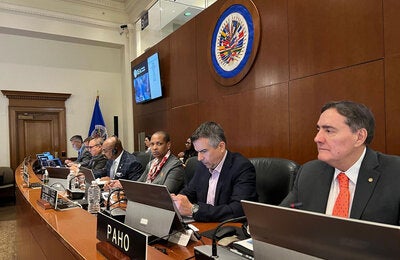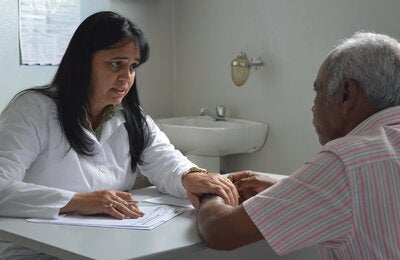Washington, D. C., 17 October 2008 (PAHO)—The persistence of cases of congenital syphilis in Latin America and the Caribbean affects infant mortality rates, maternal health and the transmission of HIV, according to experts of the Pan American Health Organization (PAHO).
PAHO's Latin American Center for Perinatology points out that every year in Latin America, more than 100,000 children die due to congenital syphilis, and 100,000 more are born infected. The Center advocates freeing new generations from congenital syphilis and urges all women to be tested during pregnancy.
The Latin American Day Against Congenital Syphilis is commemorated every October 18, and PAHO notes that congenital syphilis continues to be an important problem.
"Currently, simple rapid diagnostic tests are available for use by outpatients that require only training and basic logistical support, notes Dr. Ricardo Fescina, Director of the Latin American Center for Perinatology. "Penicillin, an inexpensive essential drug, can be given to mothers or affected babies."
The lack of systematic detection and treatment of the disease continues to be a serious public health problem in the majority of the countries of the Region.
A Pan American Journal of Public health article titled Maternal syphilis and congenital syphilis in Latin America: big problem, simple solution, said it seeks "to focus the attention of health professionals on maternal and congenital syphilis so they will undertake actions, using an inter-programmatic approach, to eliminate congenital syphilis from Latin America and the Caribbean. Eliminating congenital syphilis will only become possible if interventions targeting vulnerable groups are also implemented."
The article said, "Factors that determine the persistence of congenital syphilis as a public health problem include a lack of awareness of the seriousness of the problem among politicians, health officials, and health care providers, difficult access to prenatal care and screening services, a low demand for the test among users, and the stigma and discrimination that surround sexually transmitted diseases (STD). PAHO's role in eliminating congenital syphilis includes determining the baseline situation in the Region as a whole and in each country, developing communication and procurement strategies, supporting nationwide programs, promoting operational research, and facilitating interprogrammatic coordination."
Treatment of syphilis depends on its stage when found, symptoms and serological profile of the patient, said the authors of the article, Drs. Julia Valderrama, Fernando Zacarías and Rafael Mazín.
A conservative estimate is that every year, 330,000 pregnant women with positive syphilis test results do not receive treatment in prenatal visits. Other experts note that one third of these pregnancies will culminate in fetal loss, another third in the birth of a child with congenital syphilis and the remaining third in the birth of a healthy child.
PAHO, founded in 1902, works with all the countries of the Americas to improve the health and quality of life of their peoples. It also serves as the Regional Office for the Americas of the World Health Organization (WHO).
For more information please contact Daniel Epstein, Public Information, Knowledge Management and Communication, tel 202 974 3459,



